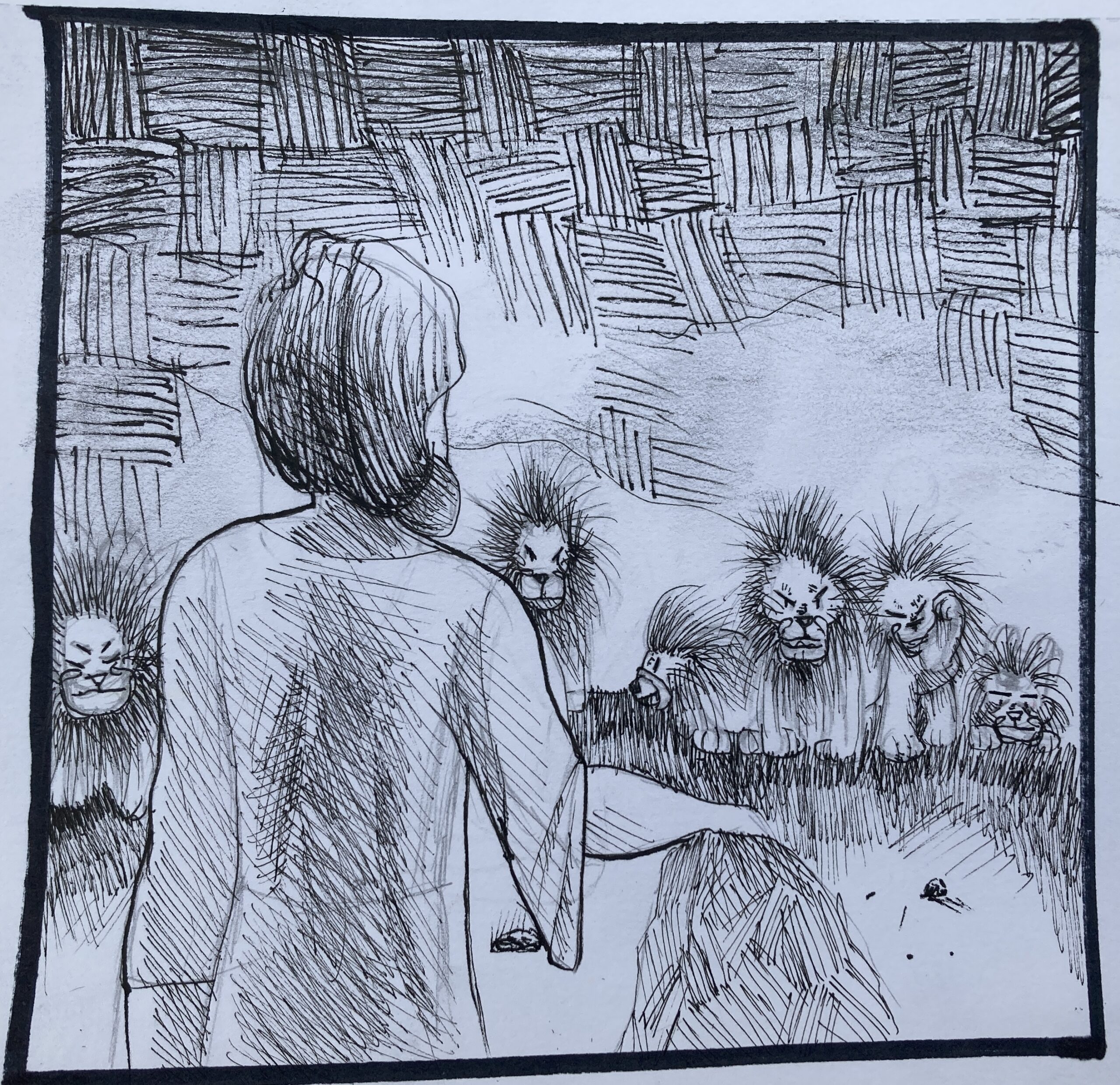Exile – The Southern Kingdom
Just the gist (for small children and others with tiny attention spans):
The Jews in Babylonian captivity remained faithful to God and the law by praying and very strictly observing the dietary laws of the Torah. God rewarded them with his protection. He allowed Daniel to interpret Nebuchadnezzar’s dreams, saved his three faithful friends from a fiery furnace, and saved Daniel from the lion’s den.
For those that can handle just a bit more:
The Judahites, or Jews as they would come to be known, were intent on remaining faithful amongst the pagans and prayed for deliverance.
Daniel was one such fellow. Thanks to his super-sleuthing and his knowledge of dendrology, he saved a woman named Susannah from death after a couple of old, creepy dudes lied about her. (Daniel 13). After that, he was summoned to work in the Babylonian king’s court but refused to eat the rich foods he was offered. Instead, he and his cohorts only ate vegetables and water in order to assure they were eating as God wanted them to eat and to make sure they kept their v-taper.
Similar to Joseph from Day 8, Daniel was able to interpret an otherwise uninterpretable dream King Nebuchadnezzar had. It was about a ginormous statue with a gold head, a silver chest, a bronze torso and iron legs and feet. It got hit with a stone and shattered. The gold is Babylon, the silver is the Medo-Persian empire and the bronze is Greece. The iron is Rome, the strongest of all the ancient kingdoms. Daniel explains that during the fourth Gentile kingdom (which we now know was Rome), the kingdom of God will arrive, represented by the pulverizing rock. (Daniel 2:31-45). The king was impressed by the interpretation and promoted Daniel and his three friends.
Fancying himself a god-maker, Nebuchadnezzar fashioned a golden image for everyone to worship. Daniel’s three friends refused to worship an inanimate object with zero power so Nebuchadnezzar had them tied up and thrown into a fiery furnace. (Daniel 3:20) To Nebuchadnezzar’s great surprise, in the fire he saw not three tied-up dead men, but four freely moving, very alive men. They were all walking around like they were just taking a steam.
The king went to the door of the furnace and called them out. They exited completely unharmed—not a hair on their head had been singed. “Man, that place was like a sauna,” they probably said. Nebuchadnezzar praised God for the miraculous deliverance.
But, Nebuchadnezzar was very stubborn and still had a tough time recognizing God as the one true God. So, God made him temporarily go insane and live as a wild animal in order to drive the point home. This time the conversion finally took. #true story
King Belshazzar was next in charge. During a party in which he and his party goers were drinking from all the gold and silver vessels stolen from Israel’s temple, he saw a disembodied hand writing on the wall. (Daniel 5: 5) When no one could figure out what the writing meant, they once again summoned Daniel. Reading the writing on the wall, Daniel told Belshazzar God didn’t think he was a super good guy and that his kingdom was about to end at the hands of the Medes and Persians. That night Belshazzar was killed and Darius the Mede took over.
Under King Darius, a bunch of governors framed Daniel with violating a religious ordinance and King Darius, obligated by the law, had to punish him by throwing him into a den of hungry lions. “May your God deliver you!” (Daniel 6:16) he yelled as he sealed up the den with a large stone. After a night of killing-my-friend-with-lions-induced insomnia, he ran to the stone and had it rolled away.
“Are you okay, Daniel?” he asked.
“Copasetic,” Daniel probably yelled back. “God sent an angel to hold all the lions’ mouths shut so they wouldn’t eat me. It was awesome.”
What Darius did to the accusing governors isn’t Christmas talk, but you can find it in Daniel 6:24.
Darius’s following religious edict was to tell everyone that Daniel’s God was the living God in that he had saved Daniel from the fairly foolproof terminality of being locked up with a bunch of hungry lions.
Daniel didn’t just spend all his time interpreting everyone else’s visions. He had his own visions too.
- the one that was similar to Nebuchadnezzar’s statue dream, only the different kingdoms in Daniel’s dream were represented by animals. Instead of a pulverizing stone, the Messianic figure that Daniel describes as “one like a son of man” (Daniel 7:13), rides in on clouds to establish his everlasting kingdom. (Daniel 7:1-28) Our birthday boy on Day 25 will grow up and refer to himself as “son of man” many times, hearkening back to this dream.
- the one with the ram, the he-goat and all the various horn configurations foretold Alexander the Great (the conspicuous horn on the he-goat) conquering the Medo-Persian empire (the ram). It went on to predict his four generals rising to power after his death (the four horns) and Antiochus Epiphanes (the little horn) popping up and persecuting the Jews and desecrating the temple. (Daniel 8) We’ll read more about that on Day 21.
- the one when Saint Gabriel the Archangel swung by with some good news and some bad news. The good news was that the Messiah was still coming. The bad news was that on account of Israel’s failure to repent, their restoration wouldn’t take place at the end of the Babylonian captivity. There were still many years of covenant therapy ahead of them. (Daniel 9)
- the one when an angel dressed like a priest came to Daniel and told him there would be a lot of fighting over Israel, a contemptible person (Antiochus Epiphanes), a final affliction and a resurrection of the dead. (Daniel 10-12)
Under King Cyrus, Daniel—Israel’s Sherlock Holmes—did more super-sleuthing. At the time, King Cyrus’s people were worshipping an idol named Bel who ate a truckload of food every day. Daniel used some ash to prove that there was an extensive hoax going on and that Bel didn’t actually exist. (Daniel 14:1-22). All involved in the deception met a not-Christmas talk end.
In addition, he demonstrated that a dragon (probably a crocodile or other large reptile) wasn’t a god when he fed it an old family recipe—cakes made of boiled pitch, fat and hair. The dragon ate the cakes and burst open. This last bit of detective work got him thrown back in the clink with the lions. Once again, the lions did not eat him and his accusers expired in, you guessed it, such a way that was not Christmas talk (Daniel14:23-42) (One would think people would stop falsely accusing Daniel of things by this point.)
Ezekiel was also a prophet during the exile. He had a very extreme style that involved performance art-like acting out of prophecies and rhetoric that would have made Flannery O’Connor blush. Ezekiel saw the presence of the Lord leave the Temple (Ezekiel 10:18) and he saw a vision of its later return (Ezekiel 43:5). That presence won’t return until our little dude on Day 25 makes his big Temple debut at the presentation.
Christmas for Beginners is now available in book form! Click here to take your Advent readings Old School.





0 Comments
Trackbacks/Pingbacks